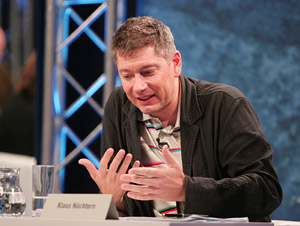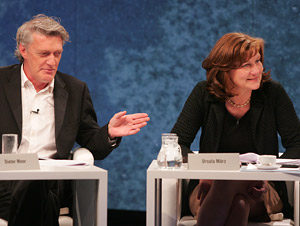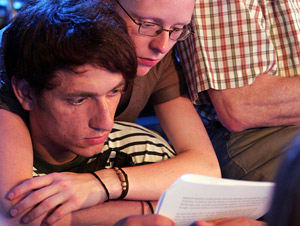
Bronsky - Diverging Opinions
Alina Bronsky's "Shattered Park," - the story of a highly gifted Russian girl in Germany in the midst of integration, self-loss and the death of her mother failed to convince most of the jury.
"This Text will never win the Büchner Prize"
Ijoma Mangold also got into great difficulties with his second author and he even admitted, "Ok, this text will never win the Büchner Prize."
Daniela Strigl praised the story about a "very bold, refreshing but also thoughtful girl." This act of role-playing via fiction is "highly successful" and "well done", right down to the smallest detail.

Self-Irony as a Weapon
Klaus Nüchtern also took the same line. He praised the "large dose of self-irony" that comes about through the way the main character, who is a bit out of it, sees life. This "assimilation winner" becomes a bit unpleasant in the course of the story. But: "her self-irony is a weapon against people like us and it protects and hardens her." Here the text shows how she "chats away" the tragedies of her life such as the death of her mother, for instance.
"Superfluously Childlike in an Artifical Way"
Ursual März could offer no praise for the text. She explained, "I would need a psychologist to understand this text!" Although the female first-person narrator is described as an "exceptionally gifted person," nevertheless her attitude towards what she relates is "superfluously childlike in an artificial way," "pseudo-naive" and "uninteresting." This "fabricated, crafty being" simply got on her nerves.

Spinnen: this is well thought out
Burkhart Spinnen also offered a critique of the narrative mindset. "In the midst of chaos, I pretend to be naive so that I don't get caught up in things." The first-person narrator is thus trying to remain "above it all." But the problem here is that the "material" is overly instrumentalised and ends up becoming subordinate to the story itself. "Yet, it's all well thought out: from Maria's small eyes all the way down to her woollen stockings."
"The text serves the readers according to their taste," Andre Vladimier Herz said. Readers will find themselves being dragged back and forth between fascination and fright. "I myself could find no peace while reading this text."

Mangold and Strigl defended Bronsky
For Ijoma Mangold, the "narrative stream" was unbelievable. Such literature centred around "the transfer of culture" is usually found in British literature yet here is a specimen of it in German literature. Daniela Strigl also gave it her backing. What Heiz criticized as "the state of being torn back and forth" actually represents a strategy. To which Spinnen replied, "Have I become so old that I'm no longer capable of being frightened?" This story of the "psychosocial, shattered girl" was old hat to him. Alain Claude Sulzer agreed that there is so much that is "predictable." "There was nothing that surprised me."